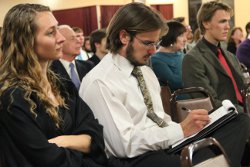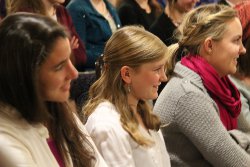- Home
-
About
 Fidelity & Excellence
Fidelity & ExcellenceThomas Aquinas College is unique among American colleges and universities, offering a faithfully Catholic education comprised entirely of the Great Books and classroom discussions.
-
A Liberating Education
 Truth Matters
Truth MattersTruth, and nothing less, sets men free; and because truth is both natural and supernatural, the College’s curriculum aims at both natural and divine wisdom.
-
A Catholic Life
 Under the Light of Faith
Under the Light of FaithThe intellectual tradition and moral teachings of the Catholic Church infuse the whole life of Thomas Aquinas College, illuminating the curriculum and the community alike.
-
Admission & Aid
 Is TAC Right for You?
Is TAC Right for You?Do you enjoy grappling with complex questions? Are you willing to engage in discussions about difficult concepts, with the truth as your ultimate goal?
-
Students & Parents
 Mind, Body & Spirit
Mind, Body & SpiritThere is always something to do at TAC — something worthwhile, something fulfilling, and something geared toward ever-greater spiritual and intellectual growth.
-
Alumni & Careers
 What Can You Do with a Liberal Education?
What Can You Do with a Liberal Education?Nothing speaks more to the versatility of the College’s academic program than the good that our alumni are doing throughout the Church and the world.
- Search
- Giving
Dr. Vincent Phillip Muñoz Lectures on The Founders, Church & State
On Friday evening the students and faculty of Thomas Aquinas College gathered for the annual Presidents’ Day Lecture, presented by Dr. Vincent Phillip Muñoz, associate professor of religion and public life and associate professor of law at the University of Notre Dame. The address, part of the St. Vincent DePaul Lecture Series, was titled, “Did the American Founders Intend to Separate the Church from the State?”
In his lecture, Dr. Muñoz laid out the common liberal and conservative understandings of the founders’ approach to the role of religion in public life. “The key to the founders’ solution, in the liberals’ story, is the privatization of religion and the elimination of religion from the public square,” said Dr. Munoz. “Conservatives,” he continued, “agree that the founders meant to separate church from state, but they deny that this means religion must be separate from politics.”
According to Dr. Muñoz’s research, however, “the historical record is more complicated — and more interesting — than either the liberals or the conservative story would let us know.” Dr. Muñoz spent most of the lecture examining this record, analyzing the writings of Jefferson (whose position most closely resembles that of today’s liberals), Washington (most sympathetic to modern conservatives), and Madison (somewhere in between). “There is no single church-state position that can claim the exclusive authority of America’s founding history,” he concluded. “No one founder’s position should be assumed to reflect the original meaning of the Constitution.”
Yet despite the lack of consensus among the nation’s founders, Dr. Muñoz insisted that their opinions still be taken seriously. “Because they disagreed, they advanced arguments to defend their competing positions, and they made those arguments using philosophical reasoning and prudential calculations that can be as applicable today as they were 200 years ago,” explained Dr. Muñoz. “I probably don’t need to say this to this audience, but disregarding the founders because they disagreed or because they wrote in a different age unnecessarily overlooks the thoughtfulness of some of America’s greatest political thinkers.”
In thanking the audience for the opportunity to speak, Dr. Muñoz admitted that this, his first visit to campus, was “bittersweet” because, in hindsight, he wishes he had come to Thomas Aquinas College as an undergraduate. “Appreciate what you have,” he told the students. “It’s truly amazing.”
Then, addressing the College’s benefactors and administrators, Dr. Muñoz added, “What you’re doing here — we need it, badly. Colleges and universities are changing rapidly, and most colleges and universities, I think, need to change and adapt. But this place — with its dedication to the pursuit of truth, the pursuit of beauty, truth illuminated by the faith — this place needs to stay the same. So stay the course and do what you’re doing.”



